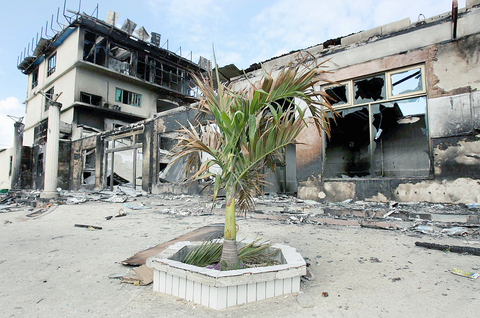International troops secured the airport in Tonga's riot-scarred capital, but commercial flights allowing frightened foreigners to leave were not expected to resume for another day because of church services in the heavily Christian country, commanders said yesterday.
New Zealand and Australian troops secured Tonga's international airport within hours of arrival on Saturday, erasing the main concern of hundreds of people trapped in the tiny island kingdom.
At least eight people were killed when pro-democracy gangs looted and rioted on Thursday through central Nuku'alofa, leaving residents and foreigners terrified as the kingdom became isolated when the sole airport shut down.

PHOTO: AP
But the situation calmed with confirmation that the airport was secured and flights would resume today.
"The troops are not visible, but people are pleased they are there because they just want to get the aircraft coming in," Tongan journalist Mary Fonua said yesterday.
Prime Minister Fred Sevele yesterday rejected calls for his resignation in the wake of the riot and destruction.
Pro-democracy leaders claim Sevele and his government were responsible for delays in implementing political change that helped foment the violence.
"Government is not to be blamed for what happened on Thursday," he told New Zealand's TV3 News.
"I don't think anyone ever thought, even the instigators of this whole problem never thought, things would get out of hand," Sevele said.
"It's a day of shame for us Tongans," he said.
The riots erupted when the legislators looked likely to adjourn for the year without making a decision on expanding democracy, enraging pro-democracy activists.
Calm was restored on Friday following an emergency meeting of the Cabinet, nobles and elected commoners agreed to meet the pro-democracy demands.
Legislators elected by popular vote will represent the majority in parliament at the next election in 2008, ending centuries of rule by nobles and people appointed by the royal family.
Journalists escorted by the military through the riot scene spoke of the "complete destruction" of the city center.
"The shops not burned have been looted and smashed completely. It's utter devastation," Fonua said.
New Zealand and Australia sent in 110 troops and around 44 police officers at the Tongan government's request.
"We judge that as an adequate number to keep the situation quiet, and hopefully there won't be any more problems and we'll be able to withdraw fairly soon," Australian Foreign Minister Alexander Downer said on ABC TV.
Downer said any of the 300 Australians in Tonga could be evacuated if they wished.
"That's up to them. Some of them feel a bit nervous depending on who they work for ... and others feel perfectly safe," he said.
Eleven people flew to New Zealand on Saturday night on the return flight of a New Zealand Air Force Boeing which ferried troops into Tonga. They included Maliana Sevele, one of the prime minister's daughters, whose supermarket was the first target of the rioters.
She did not want to talk to the media, but a relative told Radio New Zealand Sevele's family feared it was being targeted so she felt the safest thing was to fly to New Zealand until the situation calmed down.
About 34 Australians also sought a seat on a military aircraft returning to Australia.

‘SHORTSIGHTED’: Using aid as leverage is punitive, would not be regarded well among Pacific Island nations and would further open the door for China, an academic said New Zealand has suspended millions of dollars in budget funding to the Cook Islands, it said yesterday, as the relationship between the two constitutionally linked countries continues to deteriorate amid the island group’s deepening ties with China. A spokesperson for New Zealand Minister of Foreign Affairs Winston Peters said in a statement that New Zealand early this month decided to suspend payment of NZ$18.2 million (US$11 million) in core sector support funding for this year and next year as it “relies on a high trust bilateral relationship.” New Zealand and Australia have become increasingly cautious about China’s growing presence in the Pacific

The team behind the long-awaited Vera Rubin Observatory in Chile yesterday published their first images, revealing breathtaking views of star-forming regions as well as distant galaxies. More than two decades in the making, the giant US-funded telescope sits perched at the summit of Cerro Pachon in central Chile, where dark skies and dry air provide ideal conditions for observing the cosmos. One of the debut images is a composite of 678 exposures taken over just seven hours, capturing the Trifid Nebula and the Lagoon Nebula — both several thousand light-years from Earth — glowing in vivid pinks against orange-red backdrops. The new image

ESPIONAGE: The British government’s decision on the proposed embassy hinges on the security of underground data cables, a former diplomat has said A US intervention over China’s proposed new embassy in London has thrown a potential resolution “up in the air,” campaigners have said, amid concerns over the site’s proximity to a sensitive hub of critical communication cables. The furor over a new “super-embassy” on the edge of London’s financial district was reignited last week when the White House said it was “deeply concerned” over potential Chinese access to “the sensitive communications of one of our closest allies.” The Dutch parliament has also raised concerns about Beijing’s ideal location of Royal Mint Court, on the edge of the City of London, which has so

Canada and the EU on Monday signed a defense and security pact as the transatlantic partners seek to better confront Russia, with worries over Washington’s reliability under US President Donald Trump. The deal was announced after a summit in Brussels between Canadian Prime Minister Mark Carney and European Commission President Ursula von der Leyen and European Council President Antonio Costa. “While NATO remains the cornerstone of our collective defense, this partnership will allow us to strengthen our preparedness ... to invest more and to invest smarter,” Costa told a news conference. “It opens new opportunities for companies on both sides of the